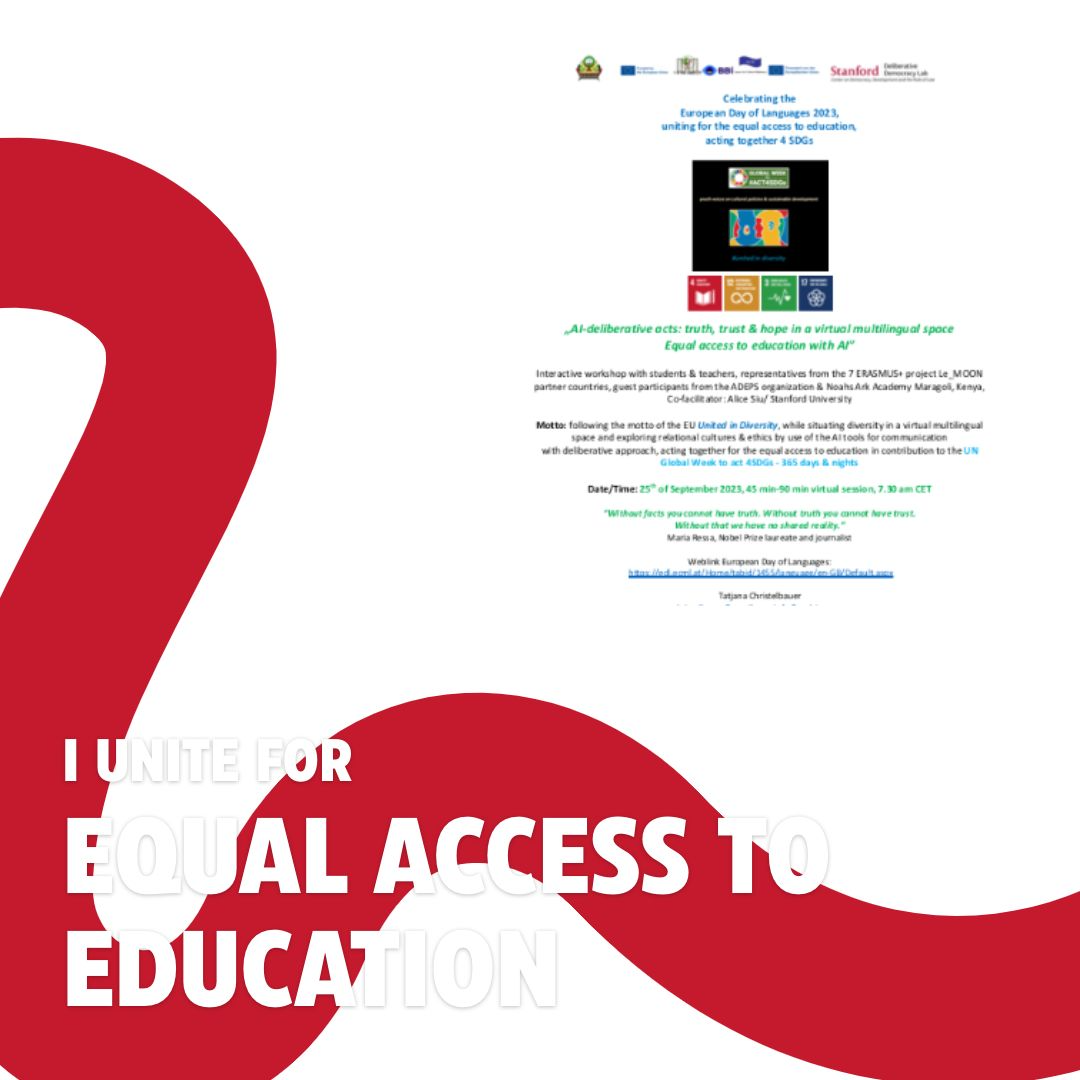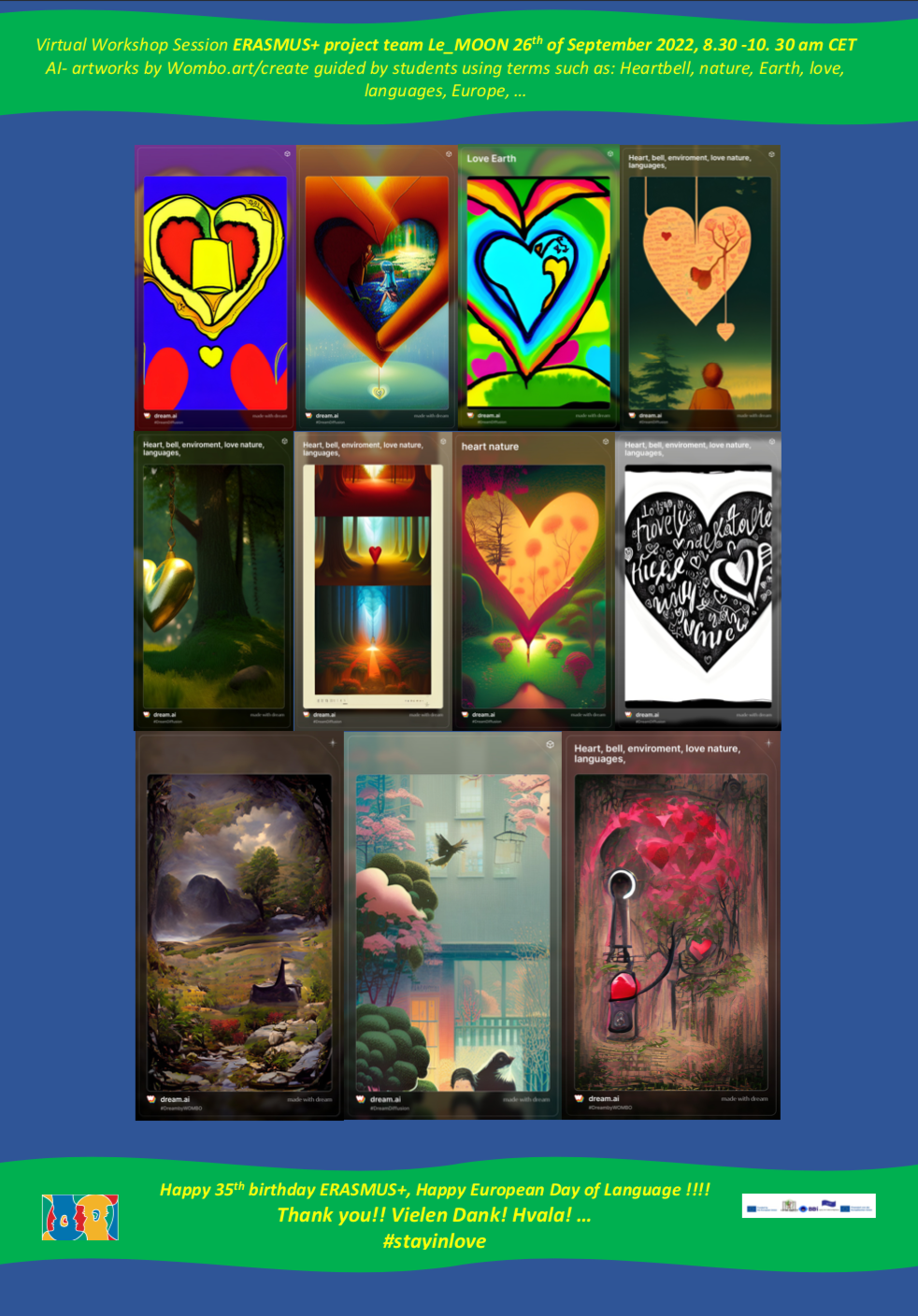"Artificial Intelligence has a great potential to transform education and training for students, teachers and school staff. It can help students with learning difficulties and support teachers through individualised learning. But the use of AI and data comes with privacy, security and safety risks, especially when it involves our young people. Therefore, I am pleased that these Guidelines will help ensure that these risks are being considered and our children can be kept safe and protected.”
Quote, Source: H.E. Maria Gabriel EU Commissioner for Innovation, Research, Culture, Education and Youth
AI Acts 2030 ...
Working on the nexus of arts_science_dplomacy_policy,
SDGs: Quality learning (SDG4) 4 SDG 12 Responsible consumption, therefore improvement of the Health&Wellbeing (SDG3), Climate action (SDG 13), Peace, justice, strong institutions (SDG16) through internaitonal and cross-sectoral partnerships (SDG 17.17)
Objectives: implementation of activities while following the guidelines in the proposed legal framework presented in the EU-AI Act (in particular the Action 6- digital education and the Ethical Guidelines through international collaborations within ERASMUS+ projects, Citizen science projects, and other forms of international project partnerships with art-based methods&tools for the improvement of digital literacy and skills in particular of youth.
Keyterms: #eu-ai-act #digitalskills #youth #sdgs #art&health #steam #ehealth #responsibleconsumption #ethics #erasmusplus #action6 #horizoneurope #deliberativeapproach
Introduction: the projects are aimed to holistically address mental health, responsible digital consumption, and inclusive education by introducing art-based tools, assistive technologies, for balanced online-and on-site education, enhance gender_equality.
inclusive, deliberative approach
Through a multi-faceted approach, the project seeks to enhance digital literacy, 4 optimising relational cultures and practicing responsible consumption of new media technologies, co-developing ethical guidelines in use for preventing violence in a virtual space, support mental health and well-being, optimise equal access to education, while engaging with assistive technologies and collaborating with blind and visually impaired students, and teachers, developing international cross-sectoral partnerships, contributing to the improvement of digital education for high school students & teachers. with adaptable tools for cross-generational and for cross-sectoral implementation.
Following research questions are composed for the project collaborations, aimed to explore various aspects of AI's role in cultural diplomacy, responsible social media consumption for high school students and teachers, and the support AI can provide to blind students in online learning while embracing cultural values and sustainable development goals. Researchers can investigate these areas to gain insights into how AI can contribute to creating a more inclusive and culturally aware digital landscape:
1. Role of AI in Cultural Diplomacy:
a. How can AI be utilized to enhance cross-cultural communication and understanding through digital platforms in cultural diplomacy?
b. What are the potential benefits and challenges of using AI to bridge cultural gaps and promote mutual respect and appreciation for diverse cultural values? c. How can AI contribute to the dissemination of cultural heritage and art as tools for promoting cultural values and fostering global harmony?
2. Responsible Consumption of Social Media for High School Students (Including the Blind):
a. What are the impacts of social media usage on the digital wellness and mental well-being of high school students, including those with visual impairments?
b. How can digital media literacy programs be designed to empower high school students, including the blind, to critically evaluate and responsibly engage with social media content?
c. What role can AI play in developing assistive technologies to make social media more accessible and inclusive for blind students?
3. AI Support for Blind Students in Online Learning:
a. How can AI-driven technologies, such as natural language processing and text-to-speech, enhance the educational experience and accessibility for blind students in online learning environments?
b. What are the potential dangers or challenges of relying on AI for educational support for blind students, and how can they be mitigated to ensure inclusive and effective learning experiences?
c. In what ways can AI empower blind students to actively participate in virtual classrooms and engage with course materials to foster independent learning?
4. Benefits and Risks of AI in Online Learning for Blind Students:
a. What are the benefits of using AI-powered adaptive learning systems to personalize education for blind students, and how does it impact their learning outcomes and engagement?
b. What are the potential risks associated with the use of AI algorithms in tailoring educational content for blind students, particularly regarding data privacy and algorithmic biases?
c. How can educators and developers ensure that AI-driven online learning platforms provide accessible, accurate, and inclusive content for blind students?
5. AI in Cultural Diplomacy for Sustainable Development Goals (SDGs):
a. How can AI be leveraged to promote cultural values and practices aligned with the United Nations Sustainable Development Goals, fostering global collaboration for a more sustainable future?
b. In what ways can AI support cultural diplomacy initiatives that embrace and empower marginalized communities and individuals, fostering inclusivity and diversity in achieving SDGs?
c. What role can AI-driven data analytics play in identifying cultural values and practices that contribute positively to sustainable development, and how can this knowledge be used to inform cultural diplomacy efforts?
Project description and proposal on the EU EPALE platform
art-based attempts to AI ^KI
Ethics in AI: human values-centered design seeks to ensure that AI is developed and used in a way that aligns with human values and ethical principles, and contributes to the well-being of individuals and society as a whole.
Examples of useful tools for detecting cyberbullying and harm in social media:
deep text (Fb), NLP / ELE Europe, INB Watson Natural Language Clasifier NLC – sentiment analysis, detecting ciberbullying incidences & alert parents, OCDD – deep learning method (detecting cyberbullying, hate speech on Twitter), Re-think app (#Instagram- detection of harm in photo images), a.o
Source from chatGBT: https://chat.openai.com/chat and: https://futureoflife.org/ai/benefits-risks-of-artificial-intelligence/

Wittgenstein & AI Symposium NCH London, presentation "One Orange Feather Flight"
We must strive to develop AI in a way that supports human well-being and enhances our ability to solve complex problems by developing AI systems that are transparent, accountable, and aligned with human values. This includes efforts to develop algorithms that are sensitive to issues of bias and discrimination, as well as efforts to ensure that AI systems operate within legal and ethical frameworks, embedding ethical considerations into the algorithms themselves, it is also important to promote critical thinking and emotional intelligence in those who develop and use AI technologies. This can include education and training programs that emphasize the importance of ethical decision-making, as well as programs that foster greater awareness of the social and cultural implications of AI
References: The IEEE Global Initiative on Ethics of Autonomous and Intelligent Systems; The Responsible AI Toolkit: This toolkit, developed by the World Economic Forum, provides guidance and best practices for the development and deployment of AI technologies that are transparent, accountable, and aligned with human values; ELE - European Language Equality program which goal is to ensure complete digital language equality in Europe in 2030: https://european-language-equality.eu/agenda/

Ethical imagination, thought experiments, somatic awareness, embodied knowledge: art_science project series with AI art & linguistic technologies:
Crossword 2030 ... investigations
assistive technologies, Braille online, AI supported screen reading; cross-sectoral, international partnerships & collaborations
Acting together: meeting anualy for the celebration of the
European Day of Languages & the UN Global weeks to act4SDGs


AI for the blind & visually impaired.
#bemyeyes:

promoting and providing tools for blind & visually impaired
Educational sessions by
ERASMUS+ projects
Reading, following, adapting and promoting recommendations from relevant entities such as the UNESCO: Beijing Consensus on AI and education
AI & Education: Guidance for Policy Makers
AI Diplomacy EU; AI for Space by ESA
Research questions focused on improving skills and digital literacy of high school students for the optimal implementation of the guidelines and rules provided in the EU AI Act:
8composed with the assistance of the Chat GPT)
1. Assessing Digital Literacy and Awareness:
a. What is the current level of digital literacy and awareness among high school students and civil society regarding AI technologies and their potential impacts on daily life?
b. How can educational institutions and civil society organizations enhance digital literacy programs to empower individuals to understand and navigate the complexities of AI applications and risks?
2. Identifying Skill Gaps for AI Implementation:
a. What are the specific skill gaps that high school students and civil society face in understanding, utilizing, and complying with the EU AI Act's guidelines and regulations? b. How can educational curricula and training initiatives be tailored to address these skill gaps and prepare individuals to effectively engage with AI applications responsibly?
3. Assessing AI Ethics Education:
a. What are the current approaches to integrating AI ethics education into high school curricula and civil society engagement initiatives?
b. How can AI ethics education be enhanced to instill a strong sense of responsibility and accountability when using AI technologies, aligning with the values set forth in the EU AI Act?
4. Enhancing Stakeholder Participation:
a. How can civil society organizations, educators, and policymakers collaborate to encourage active participation and input from high school students and the broader public in shaping the implementation and enforcement of the EU AI Act?
b. What strategies can be employed to ensure that the voices of diverse communities are represented in the decision-making process?
5. Addressing Loopholes and Exceptions in the EU AI Act: a. What are the most significant loopholes and exceptions in the EU AI Act that may hinder its effectiveness in mitigating risks associated with AI applications?
b. How can policymakers and stakeholders work together to address these gaps and ensure that the Act maintains a comprehensive and robust framework for regulating AI technologies?
6. Evaluating the Flexibility of the EU AI Act:
a. How can the EU AI Act be made more flexible and adaptive to emerging AI applications and unforeseen sectors, while still maintaining strong regulatory oversight? b. What mechanisms can be introduced to enable timely updates to the Act in response to changing technological landscapes?
7. Comparing AI Regulations Globally:
a. How does the EU AI Act compare to AI regulations in other regions and countries, and what lessons can be learned from existing approaches to enhance its impact on global AI standards?
b. What potential areas of collaboration and harmonization exist between different regulatory frameworks to ensure a consistent and coherent approach to AI governance worldwide?
These research questions aim to explore ways to enhance digital literacy, AI education, and stakeholder engagement to ensure effective implementation of the EU AI Act and maximize its potential positive impact on society. Researchers can investigate these areas to provide insights and recommendations for policymakers, educators, and civil society organizations to foster responsible and ethical AI practices.
Taking part in the Nobel Prize summit global conversations 2023:
AI Art by Wombo artworks created by participants in ERASMUAS+ project LeMOON -high school students during the workshop for the European Day of Languages under the motto #heartbell

Most materials and informations on webpages are available under the open-source license international 4.0 CC-BY SA(for more information, please see https://creativecommons.org/licenses/by/4.0/), few of them are limited only to non-commercial use, so check carefully the applicable license.





